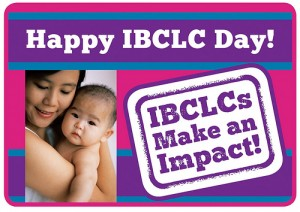
![]()

PROVA para CONSULTOR em AMAMENTAÇÃO – IBLCE 2013
Informações atualizadas
– Haverá apenas uma data limite para inscrição ao exame IBLCE 2013 de Consultor Internacional em Amamentação – 31 de março de 2013!! Organize-se!
– Por esse motivo não haverá desconto para pagamento antecipado. O valor da taxa de inscrição para o exame desse ano será de US $ 255 para quem fará o exame pela primeira vez e de US $ 250 para quem for se recertificar por exame.
– No momento estou traduzindo para o portugues a ficha de inscrição e o formulário para pagamento, que deverá ser feito exclusivamente com débito em cartão de crédito internacional (verifique com sua operadora se seu cartão de crédito está autorizado a receber débitos do exterior. Facilite sua vida – e a minha! – e já vá fazendo isso para evitar transtornos mais tarde).
– Esses documentos estarão disponíveis em poucos dias na página do IBLCE na internet (ww.iblce.org/iblce-in-the-americas) e possivelmente na nossa página do Facebook – IBLCE Brasil; peça para ser adiconado e receber informações mais rapidamente, fazer contato com outros candidatos ou outros consultores, organizar grupos de estudo para o exame e outras informações.
– A data do exame será, como ocorre tradicionalmente, na última segunda-feira do mês de julho – dia 29 de julho de 2013, esse ano.
– Novamente o exame no Brasil será realizado apenas em Centros de Computação credenciados, praticamente em todas as capitais brasileiras e algumas cidades do interiror, facilitando a vida dos candidatos, diminuindo custos de deslocamento e dando oportunidade para que mais profissionais, de todas as regiões do Brasil, tenham acesso ao exame. Localize a cidade mais proxima de você para realização do examen no site: http://www7.pearsonvue.com/Dispatcher?application=VTCLocator&action=actStartApp&v=W2L&cid=721.
Bons estudos!
Cordial abraço e fico à disposição para outros esclarecimentos.
Roberto Mario Issler
Coordenador para o Brasil – IBLCE
APRESENTAMOS abaixo uns exemplos de perguntas da prova que será em português:
These sample questions are indicative of the types of questions you can expect on the IBLCE
certification exam for lactation consultants. They are NOT representative of the overall degree of
difficulty of the exam. Correctly answering these questions is NOT an indication that you are ready
to pass the IBLCE exam. The number and letter in parentheses after each question indicates the
Chronological Period and Discipline of the IBLCE Exam Blueprint that the question tests. The answers
are shown at the end.
1. A woman interrupts your breastfeeding class to ask you about breastfeeding an anticipated
adopted baby. She has been using an electric pump and has generated a 1-oz (30ml)
per day supply. What should you do FIRST?
A. Praise her for her interest and offer to meet with her later to discuss it further.
B. Ask how she plans to provide nutrition for the baby beyond her own 1-oz (30ml) per day
production.
C. Thank her for attending and ease her out the door as quickly as possible.
D. Inform her that it is unlikely she will bring in more milk. [1-G]
2. A pregnant woman contacts you after attending a prenatal class on infant feeding. The
instructor has been very positive about breastfeeding, but emphasized that lactation hormones may
affect sexual functioning. You should tell her that lactation hormones usually:
A. reduce libido.
B. increase libido.
C. reduce vaginal lubrication.
D. increase vaginal lubrication.
E. do not affect libido or vaginal lubrication. [2-B]
3. Which of the following techniques minimizes the risk of causing nipple trauma?
A. Position the infant on his back in his mother’s arms and elicit the rooting reflex; when the infant
turns his head, place the nipple in his mouth.
B. Support the breast using the first and second fingers on either side of the areola.
C. Prevent the nipple from coming in contact with the infant’s soft palate to decrease the incidence
of tongue thrusting.
D. Position the infant so that his entire body faces the mother, and much of the areolar tissue is in
the infant’s mouth. [5-L]
4. The MOST advantageous moment for the first breastfeed of a premature infant is when the baby
is:
A. awake and in an alert state.
B. crying from a recently performed procedure and needing comfort.
C. relaxed, peaceful, and drowsy.
D. in a deep sleep and unable to resist an attempt to put the breast into his mouth. [4-L]
Leia mais aqui no www.aleitamento.com seção ILCA/IBCLC
Recomendamos como referência o livro: “Amamentação – Bases Científicas”, 3a. ed. – Editora GEN
